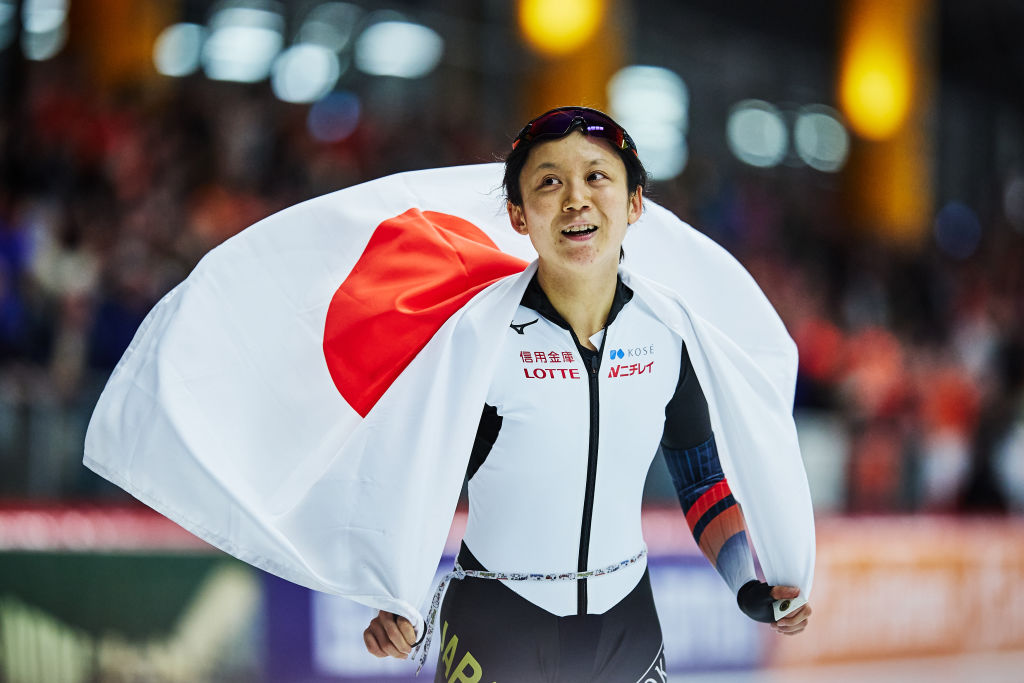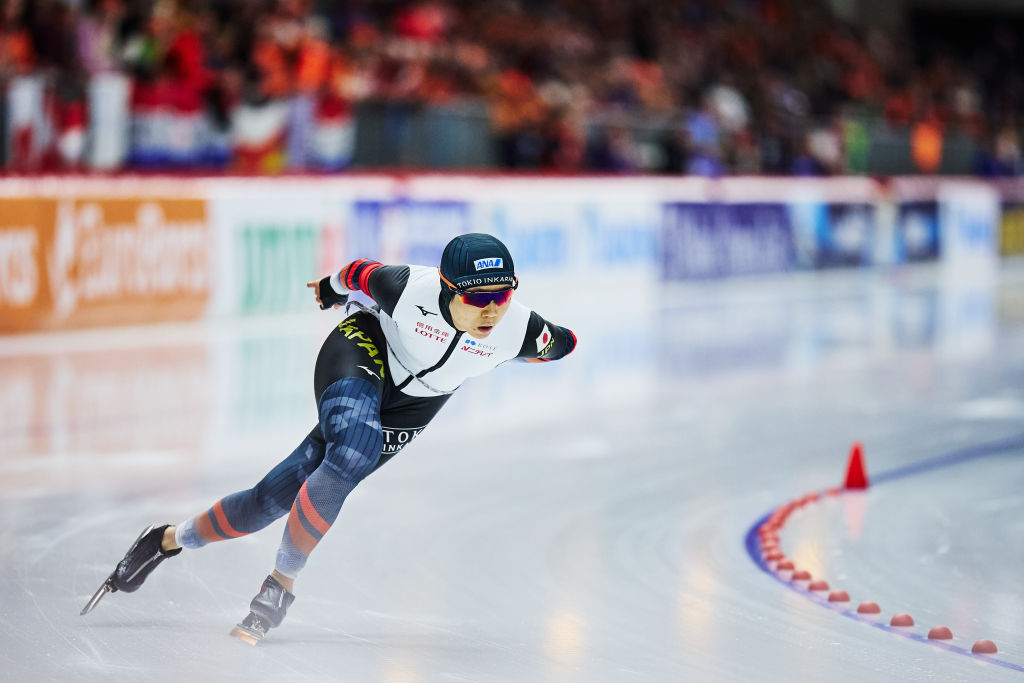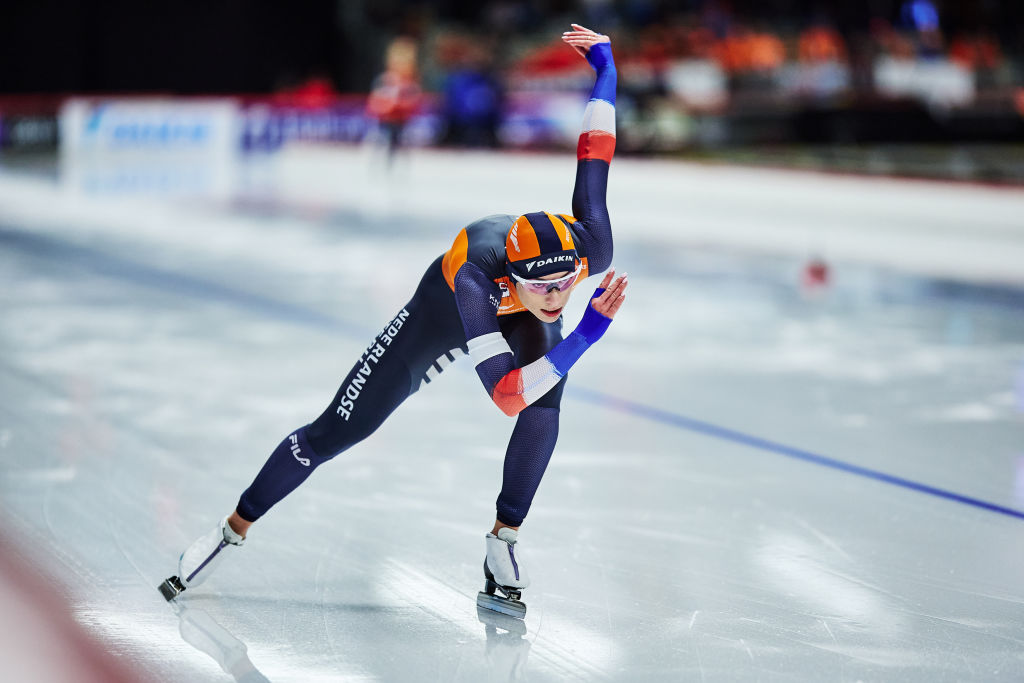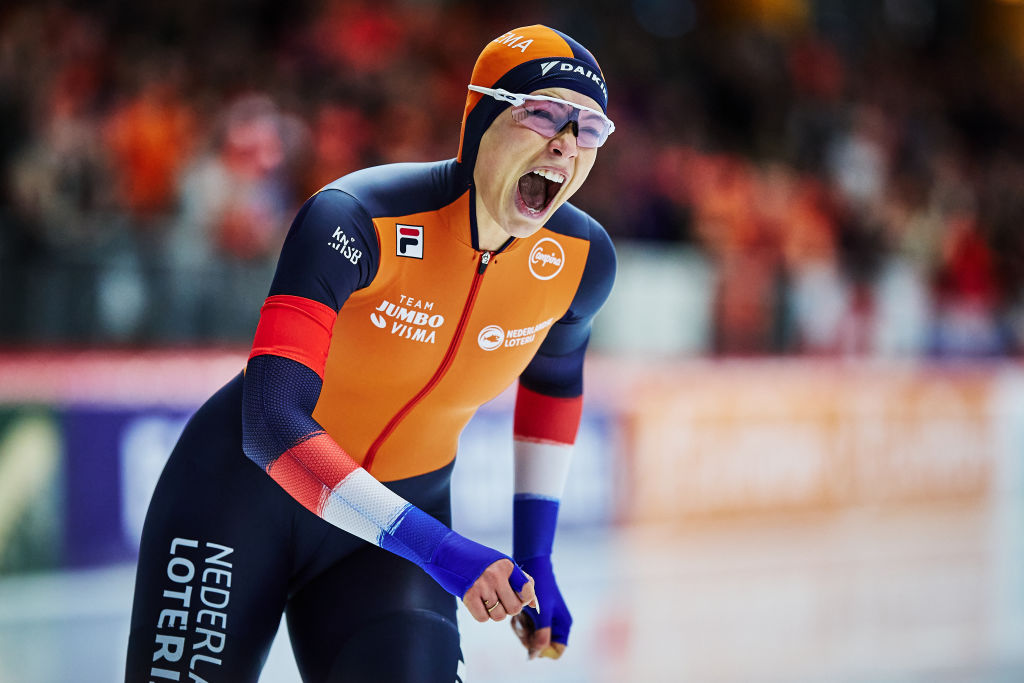
Miho Takagi (JPN) takes the title at the ISU World Speed Skating Sprint Championships in Inzell, Germany © ISU
After the first day of the ISU World Sprint Championships in Inzell, Miho Takagi (JPN) seemed to be cruising to the title, but she still had a tough battle to fight on Friday. Second ranked Femke Kok (NED) closed when she equaled the 500m track record she set on Friday, and third ranked Jutta Leerdam (NED) powered to 1:12.86 in the 1000m, beating the track record Takagi set on Thursday by .46s. The Japanese start managed to keep both Kok and Leerdam at bay in the end.
Celebrating her career second World Sprint title, Takagi was not sure about starting in the World Allround Championships on Saturday.
“I only want to start if I feel can win,” she said.

Miho Takagi (JPN) in action in the Women's 2nd 1000m at the ISU World Speed Skating Sprint Championships in Inzell, Germany © ISU
Kok equals track record to beat Takagi in 500m
Starting against leader Takagi in the final pairing of the second 500m on Friday, Kok skated like clockwork matching the 37.07s track record she had already set in the first 500m on Thursday.
Starting in the outer lane, Takagi chased an orange target on the backstretch. The Japanese 2020 World Sprint Champion almost lost balance in the corner, but managed to stay upright. Finishing in 37.19, Takagi was .06s slower than the day before, but her consistent speed over the first three distances gave the Japanese skater a solid .67s cushion in the final 1000m later on Friday.
Kim Min Sun (KOR) clocked 37.11s to finish second in the 500m, climbing to sixth place in the final classification. Olympic champion Erin Jackson, (USA) skated 37.13s to come third in Friday’s 500m, She overtook compatriot Kimi Goetz (USA) in fourth place of the overall. Goetz clocked 37.69s in the 500m to come eighth in the distance.
Jutta Leerdam (NED) retained her third place overall with a time of 37.57s and sixth place in the 500m.

Femke Kok (NED) in the Women's 2nd 1000m in Inzell, Germany © ISU
Takagi defies Leerdam challenge
Starting in the penultimate pairing, Leerdam felt that retaining her 2023 World Sprint title was not feasible anymore, but she did the only thing she could do, put maximum pressure on Takagi and Kok. With a time of 1:12.86, Leerdam was the first women to ever skate under 1:13 at the Max Aichler Arena in Inzell. She felt relieved after a season in which she had struggled with personal setbacks and technical issues.
On Thursday, Leerdam had posted 1:13.71 in the first 1000m, losing .39s to Takagi.

Jutta Leerdam (NED) wins the Women's 2nd 1000m in Inzell, Germany © ISU
“I’m just so happy to be able to skate like this again,” she said. “It’s been so frustrating to know that it’s there and not to be able to show it. Today I didn’t expect that I could do this. I’m so proud that I’ve been able to turn it around in such a short amount of time.
“I see this race as a World title. If I had been able to do this a couple of weeks ago in Calgary (at the ISU World Single Distance Championships) I would have been (1000m) World Champion.”
Takagi took on Kok in the last pairing of the 1000m. She wanted her track record back, but first and foremost she wanted to secure her world title.
Kok started a little faster than Takagi, and the 500m World Champion still had a .09s advantage at the 600m split, but Takagi made the difference in the final lap. Her 1:13.13 was enough to keep Leerdam behind.
“My goal was also to skate under 1:12,” Takagi said. “I wasn’t surprised by (Leerdam’s) time. I focused on my own race and I tried to catch Femke after 200m. That was good, but the corner from 400m to 600m was a little too slow, that’s where I lost time.
“After the 500m, maybe I was a little bit afraid of high speed in the corners. The most important thing for me was winning the title, so I also tried to stay on the safe side.”
Takagi’s name is on the entry list for the World Allround Championships on Saturday and Sunday too. The newly minted Sprint Champion was not sure if she would be up for the challenge in less than 24 hours.
“I don’t know yet. I talked with Johan (coach Johan de Wit, NED) and he told me to wait for tomorrow and see how I feel then to take a decision. I don’t just want to skate, I want to be competitive for the title.”
Kok managed to stay in Takagi’s slipstream and she too held off the Leerdam challenge, clocking 1:13.57 to finish third in the 1000m and second overall.
Even though Leerdam had set a track record in the 1000m, Kok had been confident that she would be able to keep her compatriot at bay.
“I saw 1:12 and that’s a super good time, but I knew I could stay within the (1.)4s difference I needed, even though I had never skated under 1:14 at a sea-level track before.”
“I’m content with silver,” she concluded.
Speed Skating tradition
Although the single distance format tends to get more attention because it’s Olympic style, the long track Speed Skating championships were traditionally decided by racing multiple distance tournaments. The first ISU World Allround Speed Skating Championships were held in 1893, when Jaap Eden (NED) took the title in Amsterdam (NED). The first World Single Distances Championships were held over a century later in Hamar (NOR) in 1996.
In the traditional Allround format skaters a classification is made up after four distances. Men skate the 500m and the 5000m on the first day and the 1500m and the 10,000m on the second. The women’s distances are 500m, 3000m, 1500m and 5000m.
The World Sprint Championships were first held in 1970. In this format both the men and the women skate the 500m and the 1000m twice.
In Inzell (GER), the Sprint Championships are held on Thursday and Friday, and the Allround Championships are scheduled for Saturday and Sunday.
Samalog score
In both the Sprint and the Allround tournaments the final ranking is based on the so-called samalog score over four distances. The samalog system converts times into points, with the 500m as starting point. For a 500m race, the number of seconds counts as the number of points. For the 1000m the number of seconds is divided by two to calculate the number of points; for the 1500m it’s divided by three, for the 3000m by six, for the 5000m by 10 and for the 10,000m by 20.
Program:
Thursday 7 March 2024
19:00 - 1st 500m Women
19:00 - 1st 500m Men
19:00 - 1st 1000m Women
19:00 - 1st 1000m Men
Friday 8 March 2024
18:30 - 2nd 500m Women
18:30 - 2nd 500m Men
18:30 - 2nd 1000m Women
18:30 - 2nd 1000m Men
Saturday 9 March 2024
12:45 - 500m Women
12:45 - 500m Men
12:45 - 3000m Women
12:45 - 5000m Men
Sunday 10 March 2024
13:15 - 1500m Women
13:15 - 1500m Men
13:15 - 5000m Women
13:15 - 10000m Men


